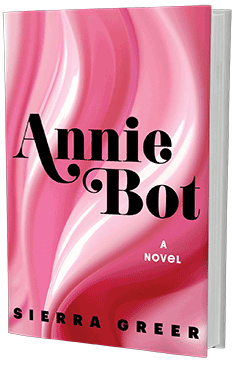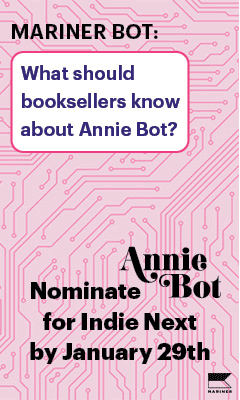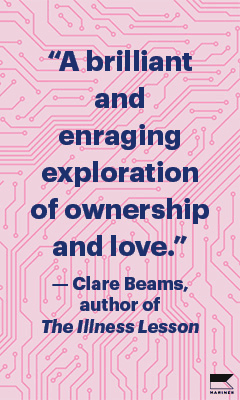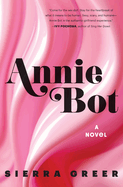Annie Bot
by Sierra Greer
Sierra Greer's timely and intimate debut, Annie Bot, digs deeply into gendered power relations through the lens of a gradually developing AI who is eager to please her owner. Greer's novel reads as one part slow-burn thriller and one part meditative relationship drama, often forgoing the spectacle of AI for the humanist questions it raises.
All Annie has ever wanted to do is make her owner, Doug, happy. Annie is a Stella, a fully functioning, female-modeled AI, originally programmed to operate in one of three modes: as a housekeeper, cook, or "Cuddle Bunny." But Doug recently switched her to the autodidactic mode. Now, everything is different. Annie's skill set is more flexible, her ability to learn and grow is advancing quickly, and she's conscious in a way that she wasn't before. Better still, Doug says he likes her this way, that he wants her to be more human. And the only thing that hasn't changed is that Annie wants whatever Doug wants.
But as Annie gradually learns to be more human, she begins to recognize the contradictions between what Doug says he wants and how he reacts to her insights, imperfections, and unpredictable responses. As the tensions within their relationship pile up--and Doug's negative reactions to her become increasingly painful--Annie begins to wonder what world might exist beyond the confines of his home and what her role in such a world might be.
Greer brings Annie's burgeoning consciousness to life with mesmerizing clarity, unspooling the minute details of her daily enlightenments and confusions in ways that makes them more relatable than other-ed. Often, her observations serve as fleeting revelations for readers as well. For instance, Annie notes how "humans talk about their lives with myopic intensity, sharing singular, subjective opinions as if they are each the protagonist of their own novel." It's impossible not to realize alongside Annie the inevitable level of self-absorption that self-awareness can bring. In this way, Annie as an AI serves as an ideal self-aware protagonist: one who is programmed to want, but capable of learning and changing the focal point of her own tumultuous journey the second she comes to consciousness. Even more so, and despite her AI design, Annie proves herself from page one to be first and foremost a compelling protagonist, one readers can empathize with, cringe alongside, and fear for.
But where Annie is an ideal protagonist, Greer smartly steers away from casting Doug as her predictable antagonist. Certainly, he plays the role well in moments of his own fear, anger, and uncertainty. But Greer treats Doug with the same nuanced sensitivity that she uses when handling Annie; he learns and changes at the same time as he, perhaps even more so than Annie, is forced to become self-aware of his own shortcomings. In this way, Greer's emotionally acute novel rejects the false binary of good and evil, right and wrong, as deftly as it rejects the binary of human and nonhuman.
Annie Bot maintains a crisp pace and steadily builds tension through its claustrophobic setting and Annie's own uncertain future. Greer's direct and concise prose often enhances the suffocating atmosphere; just as Annie cannot escape the walls of Doug's home for most of the novel, readers cannot escape the impact of the next sentence, each one delivering another figurative blow to Annie's confidence or certainty. In one tense sequence, Annie's sensitivity to Doug's moods results in a spiral of quick succession: "Obviously, it was a fight. She knew that. Her question was stupid. But she can't figure out what she did to make him so angry, and this puzzle tortures her. She can't fix it, she can't reduce his displeasure when she doesn't know what she did to cause it." This inescapability illustrates Annie's position in Doug's house, which becomes the novel's central tension. Is it possible to escape the power dynamics of intimate relationships? And, if it is, is it worth losing the relationship itself to do so?
While these emotional tensions form the novel's heart, Annie Bot also succeeds in meticulously crafting a fascinating world that seems capable of housing endless other stories and what ifs. Through Annie's journey, readers see not only the corporation that seeks to commodify the results of Doug and Annie's internal conflicts, but also the resulting ethical debates people beyond their household are forced to face daily. Even Annie's Stella functions are custom-created by Greer to push on these questions of ethical and relational limitations. The moments Annie must raise her body temperature because she senses Doug's arousal, or the custom changes Doug can make to Annie's appearance through special-order tune-ups are all technical details. Yet in Greer's clever hands, even the technical becomes achingly indicative of so much more. --Alice Martin








